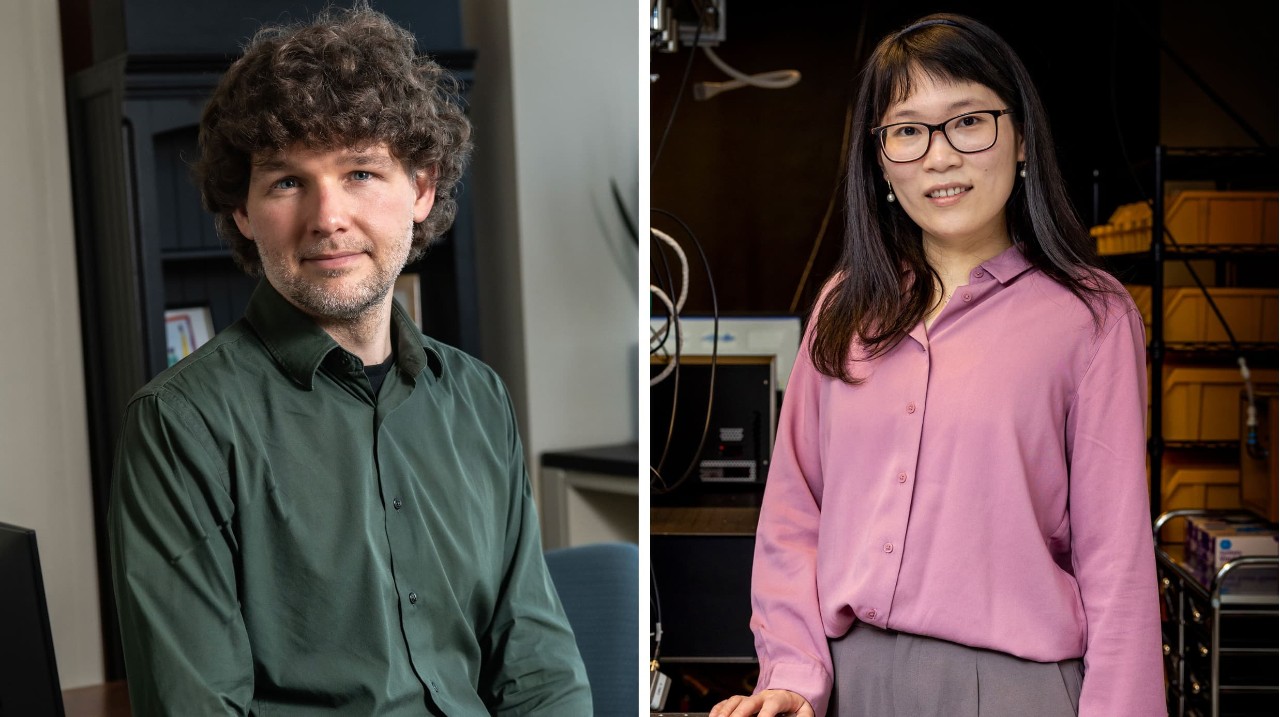Assistant Professor of Physics Qiong Ma and Assistant Professor of Psychology and Neuroscience Gregg Sparkman are among the recipients of 2023 Sloan Research Fellowships, awarded annually to leading early-career scientists in the United States and Canada by the Alfred P. Sloan Foundation.
A Sloan Research Fellowship is one of the most prestigious awards available to young researchers, in part because so many past fellows have gone on to become towering figures in science, including 56 Nobel laureates.

Gregg Sparkman and Qiong Ma (Photos: Lee Pellegrini; Caitlin Cunningham)
A Boston College faculty member since 2021, Ma is an experimental physicist who conducts quantum materials research in order to discover and understand complex materials for emergent functions.
“I was thrilled to receive this news from the Sloan Foundation,” Ma said. “This recognition is a huge boost to my morale and that of my team. The fact that my research program and direction were considered important and interesting by the Sloan selection committee, which represents a wide community, is a great source of inspiration for me.”
Ma describes her work as gluing together individual constituents of materials and turning on the interactions between them. Once activated, these novel materials exhibit collective behaviors that cannot be expected from their microscopic constituents, giving rise to emergent functions. Ma’s lab aims to understand and utilize those emergent functions for new technology.
Ma said the $75,000 that comes with the fellowship will help support student researchers in her lab, including attending scientific conferences. Last year, Ma was named one of 18 CIFAR Azrieli Global Scholars. She is also the recipient of a National Science Foundation Early CAREER Award.
“I am very grateful to the department for recognizing my efforts and providing ongoing strong support, which has allowed me to build my research program and team at BC within a short period of time, despite the challenges posed by the COVID-19 pandemic,” Ma said.
Sparkman’s research focuses on the psychology of social change, including research on interventions to address social problems related to the environment, health, and social inequity.
“I am very honored,” said Sparkman, who joined BC last fall. “Very few social psychologists have received this award—I take it as a good sign that the research we are conducting in the Social Influence and Social Change [SISC] Lab is able to make important contributions that, as the Sloan Foundation Fellowship notes, ‘have the potential to revolutionize their field of study.’”
The SISC Lab research focuses on social change, including research on scalable interventions to address pressing social problems. The group studies motivations to change behavior and investigates how best to advocate for change, including the role of social influence, identity, moral reasoning, and beliefs about whether change is possible.
“This funding will help support personnel and participant funding for research that develops novel psychological approaches to facilitate positive social change to address contemporary societal problems such as those related to climate change and social inequity,” said Sparkman.
He thanked his colleagues and mentors, including psychologists Greg Walton and Carol Dweck at Stanford University, where Sparkman earned a doctorate, and Princeton’s Elke Weber.
Fellows from the 2023 cohort were drawn from a diverse group of 54 institutions across the U.S. and Canada. The awards are open to scholars in chemistry, computer science, earth system science, economics, mathematics, neuroscience, and physics.
Fifty-six fellows have received a Nobel Prize in their respective fields, 17 have won the Fields Medal in mathematics, and 22 have won the John Bates Clark Medal in economics.
“Sloan Research Fellows are shining examples of innovative and impactful research,” said Adam F. Falk, president of the Alfred P. Sloan Foundation. “We are thrilled to support their groundbreaking work and we look forward to following their continued success.”
Ed Hayward | University Communications | February 2023



